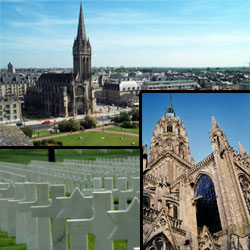
It was in this frame of mind — maudlin, depressed, stormy with sighs — that I went to Le Memorial, a museum in Caen that had been constructed fifty years after the invasion. I remember being ushered in to a dark room with about thirty other people. We were French, American, British, Italian, German, Egyptian, Brazilian, and Japanese together. We were to watch three silent films. For once, language was not a barrier.
The first film detailed the preparations and the events of D-Day itself. The second showed the course of the invasion throughout France, as Caen fell to the Allies after six long weeks, and finally, the re-taking of Paris herself. Both films were based on documentary footage, and I think that for the first time in my life I saw a film where real people were really killed.
The final film was called Esperance — Hope. This film detailed the end of the war, the dropping of the bomb, and then depicted what has happened in the subsequent fifty years. There was no sound, only the background strains of Beethoven’s “Ode to Joy.” On the screen I saw the Korean conflict, the Vietnam War, the struggle for Civil Rights, the hippie movement, the European student riots, and the Persian Gulf War. I saw the assassinations of John F. Kennedy, Martin Luther King, Jr., Bobby Kennedy, Medgar Evers, and Harvey Milk. Great luminaries such as Kennedy, King, Mother Theresa, Charles de Gaulle, Winston Churchill, Benazir Bhutto, Tito, Ronald Reagan, and Bill Clinton spoke to us from ten translations splayed across the screen.
When the three films were over, no one moved or talked. I heard several sniffles; an elderly Englishman behind me smacked his lips, quite a show of emotion for a Brit; an American, a World War II veteran, just nodded and whispered, over and over, “That’s how it was.” But whether he was talking about the war, or the century, I wasn’t sure.
Beside me sat a small Italian boy. When the film was over, he turned to his mother and spoke a few quiet words. The woman had been silent the entire time we had been in the room, but after hearing her little boy’s words, she burst into tears. She grabbed my hand and in halting French, she told me what her boy had said. I looked down at the boy, at his big brown eyes and his messy hair, at his face sticky from some confectionery, and I, too, began to cry. I turned, and in English and French, repeated what the boy had said. Someone else translated it into German, another into Japanese. Soon the room rang with the little boy’s words:
“Mama, in my eight years, there has never been a day of peace.”
The lights came on and the door was opened. Sunlight flooded the small dark room. As we stood up to leave, I looked around. A small, representative group of nations, of people, had that day learned what the world was like through the eyes of an eight-year-old, that eight-year-olds no longer lived in a world of toys and cookies, of joy and simple pleasure, of saying your prayers and being tucked in at night. Perhaps no eight-year-old has ever truly lived in a world like this; but this small boy, this one eight-year-old, he already knew that. As we left, the Englishman clutched at my arm, looked into my eyes, and said “We must change that.”
I agreed.
And for one small moment, there was peace.
Outside, in the world, I knew wars raged in places too numerous to mention, that people suffered and starved and died just at the moment that little boy had said those words. Yet in that little room, through those little boy’s simple words, we all learned a new meaning for the French word esperance — child.
I wish I could say that this tale has a happy ending, that the little boy’s words were no longer true. And yet, a year to the day I came home from France, a jet bound for Paris — one carrying several students just like me — fell from the sky. Violence wasn’t suspected — it was assumed. Though the plane exploded due to mechanical reasons, the old wounds, the old fears, surfaced everywhere. Another piece of everyone’s innocence fell into the Atlantic with that plane. And since then there have been more planes, and more war, and more innocence irreplaceably lost. And yet — yet I can not help but think of that boy, and that dark room full of people, and the promises that were made. Some of those people may now be dead, but not all of them are; I’m not. And I know, thanks to that boy, that this place, this country, this earth, could be made better, and should be made better, and somehow, for some reason I cannot explain, I feel it will be made better. I really feel that now, whereas I have never felt that way before.
And this — this is innocence.

